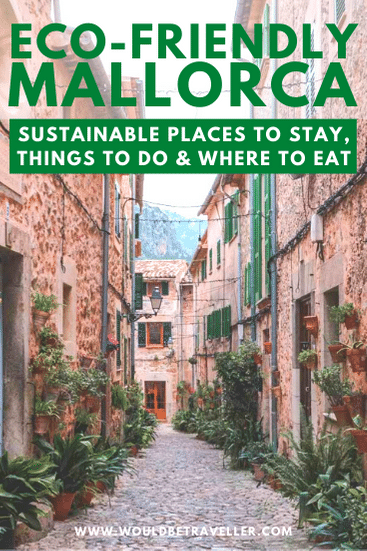There’s a lot of positives to Mallorca – hours of sunshine, spectacular scenery and beautiful stretches of coastline, but sustainability? It’s not something you would normally associate with the Balearics. Until now.
The largest of the Balearic islands, Mallorca is an outdoor and responsible traveller’s dream. It offers responsible outdoor activities, vegetarian-friendly restaurants, sustainable accommodation and eco transport too.
So if you’re looking for advice on how to have a sustainable and eco Mallorca break, you’re in the right place.
Please note: This post is part of a paid campaign to promote the Balearic and Canary Islands, as part of their #SpanishIslands Campaign. However I’ve not been told what to write and all views are my own.
Responsible activities and natural sights on Mallorca
There’s a plethora of natural sights on Mallorca that are often overlooked in place of the island’s more adrenaline-filled, commercial attractions. Here’s my pick of the bunch to keep you entertained on your eco Mallorca visit.
Cuevas Drach
The Drach Caves are a huge network of caves close to Porto Cristo. They extend for 1.2km underground at a depth of 25 metres. Following the steps down into the caverns, you’ll pass stalactites and stalagmites at your own pace until you reach one of the largest underground lakes in the world – Lake Martel. Once everyone has made it down to this point, they entertain visitors with a short underground classical music concert to demonstrate the unique acoustics of this chamber, played on a boat that rows past you.
While the caves are worth a visit any time of year, they’re especially popular during the summer to escape the heat in the most natural way possible – underground!
>> Discover more of the best towns and villages to visit on your next trip to Mallorca!
S’Albufera Nature Reserve
S’Albufera Nature Reserve is a must-visit for wildlife lovers and those looking to explore the more natural aspects of this Balearic island. It’s an area of wetland on north-west Mallorca that’s very popular among birdwatchers thanks to its population of birds that visit throughout the year. It’s also considered to have the greatest biodiversity of anywhere in the Balearics.
You can explore the park by foot or by bicycle, but you must leave your car in a nearby car park. Alternatively, you could join a guided tour that runs every Saturday. This is a great way to enjoy the park whilst learning about the wildlife that call it home.
Tramuntana Mountains and the surrounding villages
Serra de Tramuntana, or the Tramuntana Mountains, is a UNESCO protected mountain range, covering around 30% of Mallorca. Whether you explore them by hiking, cycling or driving, you can’t say you’ve been to Mallorca unless you’ve chosen one of these.
There are small Mallorca towns dotted across the mountain range, that all boast exceptional views, picturesque alleyways and pretty houses. Valldemossa is one of the prettiest villages in Spain. No trip to Mallorca would be complete without this on its itinerary. Its rolling hills, sandy turrets and the recognisable monastery are like something out of a fairytale.
Selva is another village, located at the foot of the Tramuntana mountains. While there’s not much to do in the village itself other than wander, the views of the mountain range from here are incredible. Choose to stay somewhere nearby and leave your curtains open for one of the most beautiful wake up calls in the world.
Cap de Formentor is the most northerly point of the island, and one of the highest too. The drive up here isn’t for the faint-hearted; To reach it, you’ll navigate along hairpin bends and brave steep cliffs either side of you, but the views from the top are well worth it. And if you’re incredibly lucky, you may even spot the mountain goats that call this rocky terrain their home.
Mondrago Natural Park
Mondragó Natural Park can be found on the south east coast of Mallorca, and is famous for its white sandy beaches, crystal clear waters and reef-like deposits. There are a number of different walking routes you can take to explore the area, and a good variety of animals to spot while you’re there. Look out for birds, reptiles and even the Mediterranean tortoise which was reintroduced after its resident population died out.
>> For more advice on how to travel sustainably, check out my ethical travel tips next
Sustainable places to stay in Mallorca
Agricultural tourism has grown in popularity on the Balearics, but Mallorca especially. A finca, which translates from Spanish to ‘estate’ in English, is a rural piece of land with farmhouse accommodation where tourists can stay away from the crowds. Many fincas are inherently sustainable places to stay, with swimming pools filled with spring water from the mountains, ethically sourced food and furniture made using local materials.
The Son Net hotel is set within the Tramuntana mountains and is one of the island’s most eco-friendly and luxurious hotels. The hotel champions ecological farming practices and has a strict recycling programme too.
The Monnaber Nou is another example of a rural hotel that is committed to reducing its impact on the environment. It uses solar power, serves food grown on the estate and is planting trees to support reforestation.
In Palma, opt to stay in a hotel that places focus on social responsibility rather than an all-inclusive resort. The Melia chain is well-known for its ethical practices, and has even been named as the most sustainable hotel company in the world in 2019. The chain has 7 hotels in Palma, both in the centre and along the city’s beautiful coastline too.
Vegetarian/vegan-friendly restaurants in Mallorca
Though Spain is a land of meat-lovers, there are more than enough vegan and vegetarian-friendly restaurants in Mallorca to keep your belly full whilst keeping your footprint low.
My favourites include:
- Ziva To Go serves healthy plant-based food from their hipster-style cafe in central Palma. All ingredients are organic or locally sourced, and even the takeaway food is served in biodegradable, compostable or recyclable packaging.
- Bon Lloc was the first vegan and vegetarian restaurant to open on Mallorca in 1978, serving up food made with fresh ingredients from the market. Dishes include pasta, salads, soups and burgers, all presented beautifully in the friendly and atmospheric restaurant.
- The clue is in the name, but everything at Vegan & Raw in Palma is vegan and raw. The menu is full of vegetables, nuts, sprouted seeds, cold pressed juices and green smoothies that maintain all their natural enzymes that are normally eliminated during cooking.
- Temple Natura Cafe Garden is a vegetarian and vegan restaurant with a beautiful garden. As well as the fresh and healthy food, you can also come here for yoga and pilates classes.
- Pizzeria Sa Cova is set in the heart of Palma’s old town. Alongside a traditional Italian menu with meat dishes, it also serves the largest selection of vegan pizzas in the city. The vegan menu has all your favourites, from a margarita served with soya bean cheese, to a four seasons pizza made with seitan ham.
- Sa Vida serves tapas and a huge variety of wines in a trendy restaurant in the Santa Catalina neighbourhood. While there are a number of vegetarian dishes on the menu, the friendly staff may be able to offer something special off the menu for you if you don’t fancy what’s available. When we were there, I got chatting to the waiter who served me a fantastic falafel dish that was as good as any I had in Jordan.
- El Neo is a tapas and cocktail bar just a few minutes’ walk away from the cathedral in Palma. There’s a good choice of vegetarian dishes, all presented beautifully in its bohemian and trendy restaurant with a great atmosphere.
- Despite being a steakhouse, vegetarians will be able to find something suitable in Foc i Caliu in Selva. The pizzas are delicious, as are the selection of cheese bruschetta.
Palma’s eco markets
Beyond the restaurants, there are plenty of markets in Palma to give you even more choice. Mercat de s’Olivar, Mercat de Santa Catalina and Mercat de Pere Garau are typical Spanish indoor markets, with various fruit and vegetable stalls, bakeries and cheese mongers too.
But the Ecological Market on Plaza Bisbe Berenguer de Palou, open on Tuesdays and Saturdays, is your best bet. This market is full of small, ethical vendors that offer organic, local and seasonal products at a fair price. Here, you’ll find organic fruit and vegetables, ethically sourced meat and local souvenirs, like senalla, wicker baskets made from palm leaves.
Eco-friendly ways to travel in Mallorca
Mallorca’s capital Palma is a breeze to get around on foot or bicycle as it’s so comfortable. You can use Bicipalma to hire bikes from various spots across Palma, or there are plenty of private companies from which you could hire segways too.
You can also use the EMT bus network within the city. Route number 1 runs from the airport, around central Palma and then out to the port. The mobile app MobiPalma will help you keep an eye on fares, timetables and routes across the city.
While there’s plenty to do on the island, it’s sadly not all that easy to get around it without a car. There are buses run by AEROTIB that will take you from the airport to other parts of the island, but if you’re visiting any other time than summer, they’re not very regular. Have a look at the TIB website for more information.
Alternatively, mountain biking is popular, but if you’re not relatively fit already (the mountains are TOUGH) consider reducing your carbon footprint by hiring an electric or hybrid vehicle on the island. There are car charging stations positioned across Mallorca, but it’s best to plan your itinerary in advance so you know you won’t run out of charge. For an up to date list of the car charging stations in Mallorca, visit the Open Charge Map.
Other sustainability considerations for your trip to Mallorca
Beyond the attractions, accommodation, food and transport in Mallorca, you might want to consider the following to make your trip to the Balearic island as sustainable as possible:
- Unless you already live on Mallorca, flying there is unavoidable. Consider offsetting your flights through programmes such as Gold Standard, where you can donate the cost of your carbon offsetting to projects including reforestation, installing solar panels and giving third world countries clean, safe water
- The Balearics are facing a water shortage, and in the summer of 2019, water reserves were on average 51%, with some being placed on drought pre-alert. Preserve it as much as possible by taking short showers rather than baths, turning off the taps while soaping or brushing your teeth and switching to a meat-free diet to reduce your indirect water consumption
- Pick up a local wicker basket called a ‘senalla’ instead of using plastic bags while on the island. You’ll have a wonderful souvenir whilst saving the planet!
- While it’s not considered safe to drink the tap water on Mallorca, you can fill a reusable bottle with a filter with water from a tap in place of buying bottled water every time you get thirsty.
- Consider visiting during the off-season to ease the pressure on the island’s resources. For example a visit to Mallorca in winter when it’s warm enough to not need the heating on, but cool enough to not need the air conditioning is more sustainable than a trip in the height of summer
>> Find out more reasons to visit Mallorca during the winter
***
Thanks to its natural sights, eco-friendly accommodation and sustainable places to stay, responsible travellers will find a new but unexpected destination. In Mallorca, it’s not just the trees that are green.
Pin me for later >>








